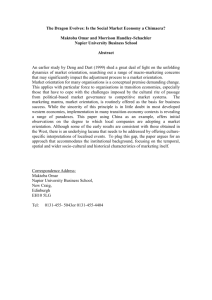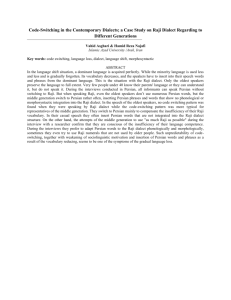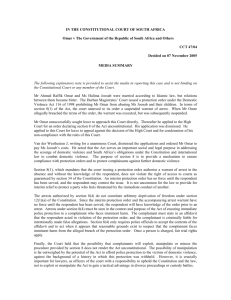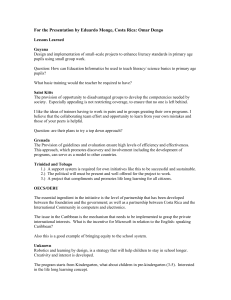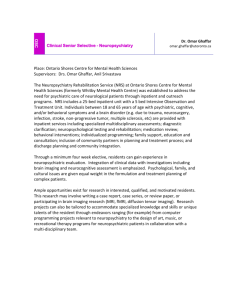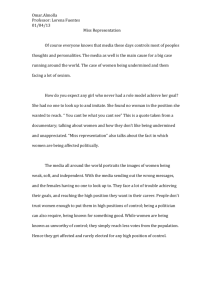Module 2 Unit 5
advertisement
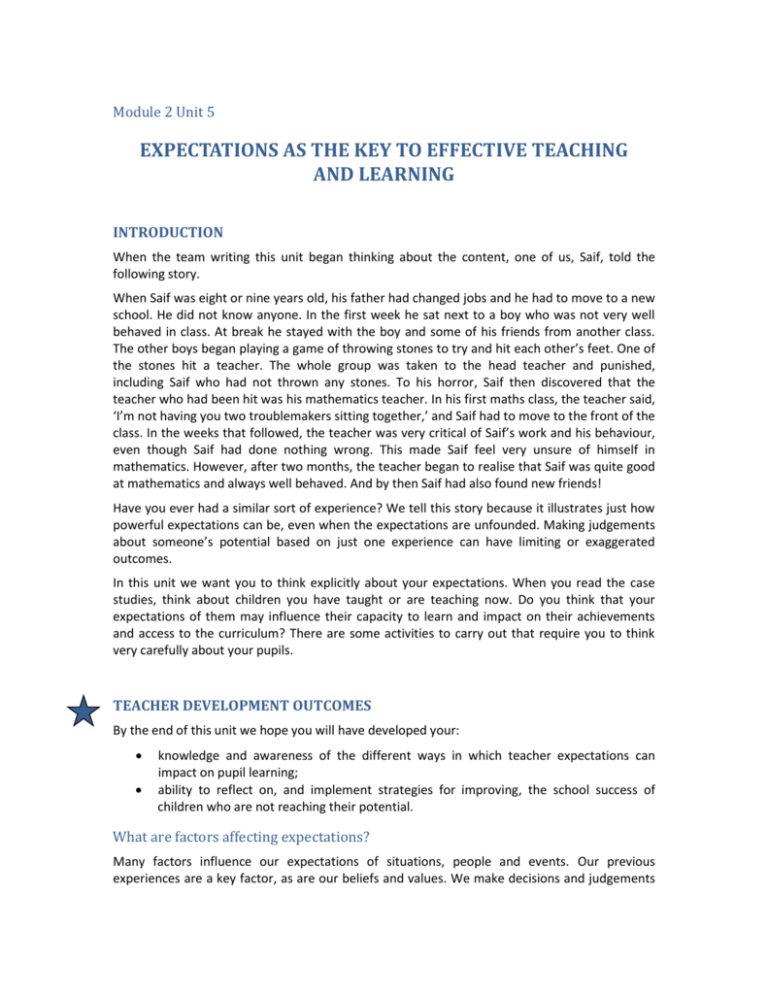
Module 2 Unit 5 EXPECTATIONS AS THE KEY TO EFFECTIVE TEACHING AND LEARNING INTRODUCTION When the team writing this unit began thinking about the content, one of us, Saif, told the following story. When Saif was eight or nine years old, his father had changed jobs and he had to move to a new school. He did not know anyone. In the first week he sat next to a boy who was not very well behaved in class. At break he stayed with the boy and some of his friends from another class. The other boys began playing a game of throwing stones to try and hit each other’s feet. One of the stones hit a teacher. The whole group was taken to the head teacher and punished, including Saif who had not thrown any stones. To his horror, Saif then discovered that the teacher who had been hit was his mathematics teacher. In his first maths class, the teacher said, ‘I’m not having you two troublemakers sitting together,’ and Saif had to move to the front of the class. In the weeks that followed, the teacher was very critical of Saif’s work and his behaviour, even though Saif had done nothing wrong. This made Saif feel very unsure of himself in mathematics. However, after two months, the teacher began to realise that Saif was quite good at mathematics and always well behaved. And by then Saif had also found new friends! Have you ever had a similar sort of experience? We tell this story because it illustrates just how powerful expectations can be, even when the expectations are unfounded. Making judgements about someone’s potential based on just one experience can have limiting or exaggerated outcomes. In this unit we want you to think explicitly about your expectations. When you read the case studies, think about children you have taught or are teaching now. Do you think that your expectations of them may influence their capacity to learn and impact on their achievements and access to the curriculum? There are some activities to carry out that require you to think very carefully about your pupils. TEACHER DEVELOPMENT OUTCOMES By the end of this unit we hope you will have developed your: knowledge and awareness of the different ways in which teacher expectations can impact on pupil learning; ability to reflect on, and implement strategies for improving, the school success of children who are not reaching their potential. What are factors affecting expectations? Many factors influence our expectations of situations, people and events. Our previous experiences are a key factor, as are our beliefs and values. We make decisions and judgements about what we should do, where we should go and whom we consider as our friends, from what we know already about people, situations and events. This is true of both our personal and our professional lives. Working as a teacher, your day-to-day decisions will be influenced by a range of factors. Think about what these might be. For example, research tells us that, all over the world, the following factors seem to influence teachers’ thinking: The child’s socio-economic background. The child’s appearance (for example stereotypes exist about tall or short students). The teacher’s experience with the child’s siblings. Gender (for example in some contexts boys are seen as more able in mathematics than girls). Can you think of other factors that might influence how you respond to the children in your class and the effect these may have had on your teaching? Do expectations hold true? The two following accounts explore what research revealed about children in two different communities when they went to school. A few years ago, educational researchers became interested in the ‘street children’ of Brazil. These were children who lived in slum areas or had no home at all. The researchers discovered that these children made very poor progress in school and performed particularly badly in mathematics. The children would sit solemnly at the back of the class and rarely participate. In the opinion of the teachers, the children’s poor background was responsible and they did not see how they could help them. The research team then went to visit these children in their homes or on the streets where they lived. All were involved in buying and selling of some kind. Many of them were able to mentally calculate currency exchanges for a variety of South American currencies. The researchers found these children engaging very successfully in complex mental arithmetic, way beyond the level expected in the school curriculum. When the team talked this through with the children, they discovered that they were using highly effective problem-solving techniques but of a very unusual kind. Such techniques were not part of the school maths syllabus at all! But there is always more than one way to solve a problem and this could have been a starting point for the teacher to involve the children in the class by acknowledging their unique way of solving the problems set. This could help all the children think of different ways to solve the same problem. In this way the children would feel much more part of the school and gradually be encouraged to participate more fully and actually have their potential realised. In the school context, therefore, expectations of mathematics achievement for these children were low, and that was borne out by subsequent school level attainment. Yet, in another context, these children were superb mathematicians! Educational researchers have also looked at Korean children who migrated to other parts of the world in the latter part of the last century. Researchers have followed up groups of such children and observed how they have performed in school. The findings are very interesting. Children who migrated to Japan, where attitudes to and expectations of Korean children were very poor, did badly at school. Children who migrated to the west coast of the USA, where expectations of Asian children were very high, did very well in school. So, children from the same sorts of homes performed very unequally in two different settings. The researchers felt that teacher expectations were the key variable here. The first activity asks you to think about your expectations of the children in your class and the expectations you have of them at school. It is important to consider how well you know your pupils as learners. ACTIVITY 11 Think about the children you teach. Identify one child whom teachers might have low expectations of. Think about why this is the case. Are there ways in which it would be possible to change expectations of this child? Make notes in your course notebook about this child. You could share your thinking and ideas with other teachers when you have made your notes – maybe at the end of the day. Next read Case Study 10 below, which describes a similar challenge faced by a teacher in Jordan. CASE STUDY 10 Raji is the head teacher at Al Nuzha School in Jordan. Omar was a boy in a Grade 5 class. He was not doing very well and would often arrive at school late. Omar was very quiet in school and tried not to be noticed. One day, Raji was returning from a meeting mid-morning when he saw Omar sitting near some shops close to the school entrance. He took Omar into school and asked him why he was not in class. The conversation took quite a long time, but Raji discovered with gentle questioning that Omar was frightened of his class. He was not reading well and he hated being asked questions he could not answer. Omar told the head teacher that he felt he was not as clever as the other children. He could not always understand the lesson but he found it hard to ask for help. Raji discovered, however, that Omar did have a number of interests. He liked cars and knew a lot about them. He helped in a garage and was very knowledgeable about engines. Omar was also interested in flags. He said his aunty had given him a book about flags and he could say the names of the countries of all the flags Raji showed him. Raji felt that Omar could do much better. He spoke to Omar’s teacher of Arabic and found a way Omar could have extra help with his reading. Then he asked the science teacher whether Omar could do a special project on engines. At the next teacher meeting, Raji asked if all Omar’s teachers could think of ways that he could become more involved in class activities to build his self-confidence. Over the next few weeks, Raji kept a special eye on him. Omar certainly seemed happier, and his attendance and punctuality improved. At the first opportunity, Raji spoke to Omar’s mother and praised his work at school. She was very pleased to hear such positive comments about her son’s progress. Comment To Omar, the school had little to offer and did not give him a feeling of confidence or self-worth, but instead reinforced his lack of confidence and decreased his self-esteem. Raji, however, believed that Omar could do better, and this was the motivation for him, as head teacher, to work on developing a more positive approach to schooling. The teachers developed a range of strategies they could use to support children who were experiencing difficulties in particular areas. For example, they planned lessons in which most of the children could work on group or individual tasks so the teacher was free to give more support and encouragement to specific children or groups of children. Think about the child you identified in Activity 11 and how you might provide more support to him/her. How perceptions of ability affect teacher expectations One issue that impacts on most school systems is how schools and teachers come to define ability. For much of the last century, the idea prevailed that ability was determined fairly early in a child’s life. Even when a child was very small, people might say things like ‘She’s a very bright child’ or ‘He is not very able’. There are also times when being part of a social or ethnic group creates negative stereotypes around children. However, research now shows that intelligence is not formed at birth, but grows, given the right circumstances, throughout life. It is also known that intelligence is multi-faceted. We do not have just one intelligence or ability, but many. But despite this, school systems in the past have often categorised children, formally or informally, in singular, general ways. Psychologists are not sure just how different types of intelligences (such as mathematical, emotional or scientific) work and how they interrelate. The reason for this is that knowledge of the way the human brain works is still quite limited. What is known is that the brain is extremely powerful and complex. Think about the amazing things you can do, the way you acquired language, the ability of some of you to converse in multiple languages, your capacity to store memories and recollections. The capacity of humans to think and speak has preoccupied philosophers and scientists throughout the ages. In recent years, advances in brain science, stimulated by new technological procedures such as brain scanning, have begun to give greater insight into how the brain operates. The point being made here is that the complexity and power of the brain indicate the problems of trying to categorise children’s abilities, particularly so early in their education. So it is important to keep your expectations of a child high, even if socio-economic or cultural factors appear to suggest something else. That is not to underestimate such factors. A child from a poor home may not have the resources (such as books or games) that a child from a wealthy home may have, and this may impact on their learning. But it is important not to stereotype the child and prejudice him/her throughout his/her schooling. Teachers and schools have a very important task in helping children overcome disadvantages. Providing equitable forms of schooling can be very challenging. Just think about the expectations and prejudices that are found around people with disabilities. In the lifetime of many of us writing this unit, children with some kind of learning impairment (such as impaired hearing or sight) have sometimes been seen as less able. Social expectations can also influence the school achievement of boys and girls. In many societies, boys achieve more in subjects such as mathematics and science because it is ‘expected’ of them. But in a number of school systems that is now changing. Girls are being encouraged to participate more in these subjects and boys are being encouraged more in literacy, traditionally seen as a stronger subject for girls. All the evidence suggests that, in the 21st century, it is possible to be much more confident about bringing nearly all children to a much higher level of learning than was thought possible in the 20th century. This will create social and economic opportunities for the individual child and for the wider community. This is more than an educational aspiration; it is fundamental to the human rights agenda, which is widely recognised today and particularly in the UNRWA educational programme. The expectations and pedagogic skill of teachers, therefore, become even more important. ACTIVITY 12 Think about the classes you teach. Identify those children who might benefit from higher expectations about what they could achieve. How might you be able to transmit different expectations to them and their classmates? Perhaps you could have a regular special word of encouragement with them. Or you could plan some activities in class (for example making a wall display) where you can set them a task that you are confident they will succeed in. Make sure you follow this up with encouraging words, either privately or in front of the class. Use your course notebook to write a short description of the children you tried to help in this way and how well it went. Comment You might also discuss this important issue with other teachers. Are there ways that the school as a whole can raise expectations? Maybe there is a way that the teachers could brainstorm how the staff, as a whole, could work across the school to raise their expectations of the children and thus raise the children’s self-esteem. How can such positive expectations be maintained over time? How can the children be involved in some of the ideas you suggest? Agreeing as a staff how you address children, especially when they are exhibiting unacceptable or inappropriate behaviour for example, can make such a difference. In such cases it is the behaviour that is inappropriate and not the child, so reprimanding using terms such as ‘silly’ or ‘stupid’ is not helpful. But if you say that was not a sensible thing to do and not the kind of behaviour you would have expected of somebody so sensible, you show the child that you respect him/her and that they have transgressed. If the behaviour stops, then the child will be restored to his previous position rather than being labelled as stupid or silly. Other whole-school actions could also have positive effects. For example, modelling ways of speaking to colleagues and other adults with respect and concern should be normal for all teachers. If teachers also show respect to children when talking with them even when they are struggling to understand a concept, then children will feel more confident to admit they do not understand, ask questions and seek help. This will contribute to developing a classroom environment where learning is supported and children feel able to explore new ideas because they can seek help if needed. In Case Study 11 we again meet Raji, the head teacher, as he strives to improve the ethos and achievements of his school. CASE STUDY 11 As head teacher, Raji was very concerned about how expectations were influencing children’s achievement in his school. He heard the teachers talking and did not feel comfortable with the way some of them talked about some of the children. Together with his staff, Raji worked on developing a strong human rights ethos in the way the school was run. They made a list of the rights they felt most important for the children. Then they made these into posters that could be put up around the school. [INSERT artwork of the following bullet points as a poster – some or all of the bullets could be illustrated] You have the right to learn. You have the right to be safe. You have the right to be helped. You have the right to be treated respectfully. You have the right to be heard. You have the right to play. In his meetings with the teachers Raji continuously stressed the importance to the child and community of raising achievement. In relation to expectations, he discussed a number of possibilities with his teachers and they came up with two interesting ideas. First, they agreed, for each grade, to have a grade level meeting twice a year to assess the progress being made by each child. Every teacher who came into contact with the child would attend the meeting. They agreed the purposes of the meeting were to identify: all the children who were making good progress; strategies for helping those children who could improve their progress. Raji was very concerned that children who needed more help were not represented in negative terms. If they were having difficulties, then it required appropriate educational and pedagogic strategies. He held a series of short, in-service, educational sessions after school. In these, the teachers explored ways of giving children relevant feedback on their work so that they could improve it and considered how to group children so they could support each other in their learning. Second, after the grade level meetings had started, Raji organised meetings for parents to talk about the expectations for the year and the ways they could help at home with their child’s education. The transformation was gradual, but even after a few weeks teachers were able to see subtle changes – such as greater participation in class and increased confidence – in many children. Comment The important point in this case study is that Raji addressed the challenge by introducing a range of complementary measures. Individual teachers had to take action, as did the staff as a whole. But this was backed up by parental engagement. Keeping an open mind about children’s potential, having high expectations about what they can achieve and planning activities that enable all children to participate will give them confidence in their abilities and encourage them to aim higher. SUMMARY It is important that teachers and educational institutions combat any societal prejudices that are based on outdated ideas. For example, our knowledge of the human brain means that we can now discard the idea that we are born with a fixed intelligence. Our intelligence can grow or, more accurately, our ‘intelligences’ can, as can our potential. How many times have you heard the suggestion that a child should be able to achieve his or her potential? Our potential is not like a bucket that needs filling! Potential can itself grow through life, just like intelligence, especially if children are motivated and supported constructively. One of the findings of brain science is that as we grow older our brains adapt and evolve and continue to show extraordinary learning power. One of the myths of the last century was the idea that you lose brain cells as you age. Not so. Our brains evolve in different ways but learning continues (and we can become wiser!). The following are examples of what having high expectations, rather than subscribing to old prejudices, can do. Children with hearing or sight impairments are able to do as well in school as anyone else. In mathematics, girls can do as well as, or better than, boys. Poor children can do well at school. Issues of disability, gender and poverty have generated significant social movements that have come to influence schools, such as the Millennium Development Goal of Universal Primary Education For All or the notion of inclusive education, which supports the education of all children regardless of their learning and physical disabilities. But schools can also influence opinion by the way they structure the curriculum and plan lessons using new and innovative ways for children to access it. As a teacher, the way you structure your expectations is the key towards effective teaching and learning and is of great importance in the wider social role you play.

